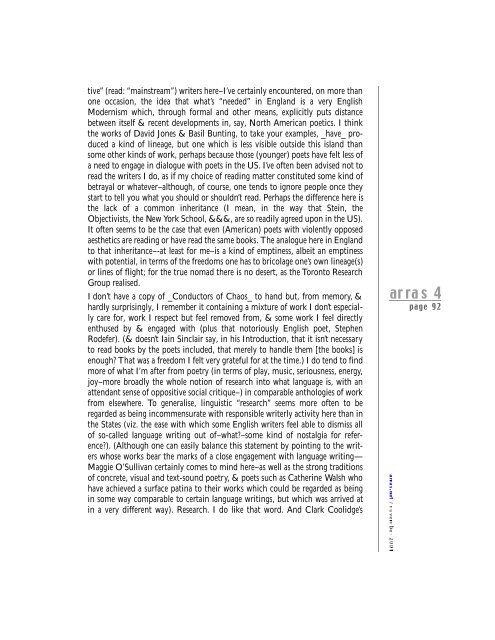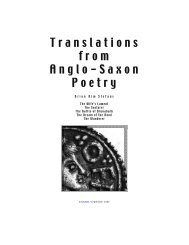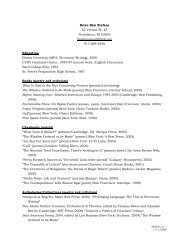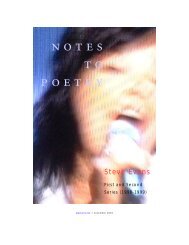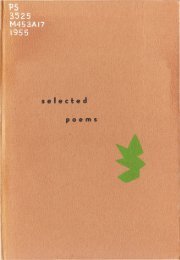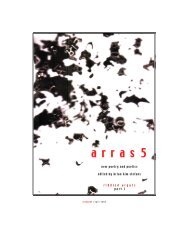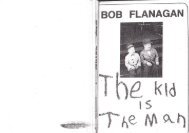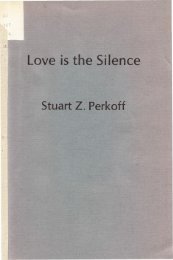new poetry and poetics edited by brian kim stefans - Arras.net
new poetry and poetics edited by brian kim stefans - Arras.net
new poetry and poetics edited by brian kim stefans - Arras.net
Create successful ePaper yourself
Turn your PDF publications into a flip-book with our unique Google optimized e-Paper software.
tive” (read: “mainstream”) writers here–I’ve certainly encountered, on more than<br />
one occasion, the idea that what’s “needed” in Engl<strong>and</strong> is a very English<br />
Modernism which, through formal <strong>and</strong> other means, explicitly puts distance<br />
between itself & recent developments in, say, North American <strong>poetics</strong>. I think<br />
the works of David Jones & Basil Bunting, to take your examples, _have_ produced<br />
a kind of lineage, but one which is less visible outside this isl<strong>and</strong> than<br />
some other kinds of work, perhaps because those (younger) poets have felt less of<br />
a need to engage in dialogue with poets in the US. I’ve often been advised not to<br />
read the writers I do, as if my choice of reading matter constituted some kind of<br />
betrayal or whatever–although, of course, one tends to ignore people once they<br />
start to tell you what you should or shouldn’t read. Perhaps the difference here is<br />
the lack of a common inheritance (I mean, in the way that Stein, the<br />
Objectivists, the New York School, &&&, are so readily agreed upon in the US).<br />
It often seems to be the case that even (American) poets with violently opposed<br />
aesthetics are reading or have read the same books. The analogue here in Engl<strong>and</strong><br />
to that inheritance–-at least for me–is a kind of emptiness, albeit an emptiness<br />
with potential, in terms of the freedoms one has to bricolage one’s own lineage(s)<br />
or lines of flight; for the true nomad there is no desert, as the Toronto Research<br />
Group realised.<br />
I don’t have a copy of _Conductors of Chaos_ to h<strong>and</strong> but, from memory, &<br />
hardly surprisingly, I remember it containing a mixture of work I don’t especially<br />
care for, work I respect but feel removed from, & some work I feel directly<br />
enthused <strong>by</strong> & engaged with (plus that notoriously English poet, Stephen<br />
Rodefer). (& doesn’t Iain Sinclair say, in his Introduction, that it isn’t necessary<br />
to read books <strong>by</strong> the poets included, that merely to h<strong>and</strong>le them [the books] is<br />
enough? That was a freedom I felt very grateful for at the time.) I do tend to find<br />
more of what I’m after from <strong>poetry</strong> (in terms of play, music, seriousness, energy,<br />
joy–more broadly the whole notion of research into what language is, with an<br />
attendant sense of oppositive social critique–) in comparable anthologies of work<br />
from elsewhere. To generalise, linguistic “research” seems more often to be<br />
regarded as being incommensurate with responsible writerly activity here than in<br />
the States (viz. the ease with which some English writers feel able to dismiss all<br />
of so-called language writing out of–what?–some kind of nostalgia for reference?).<br />
(Although one can easily balance this statement <strong>by</strong> pointing to the writers<br />
whose works bear the marks of a close engagement with language writing—<br />
Maggie O’Sullivan certainly comes to mind here–as well as the strong traditions<br />
of concrete, visual <strong>and</strong> text-sound <strong>poetry</strong>, & poets such as Catherine Walsh who<br />
have achieved a surface patina to their works which could be regarded as being<br />
in some way comparable to certain language writings, but which was arrived at<br />
in a very different way). Research. I do like that word. And Clark Coolidge’s


